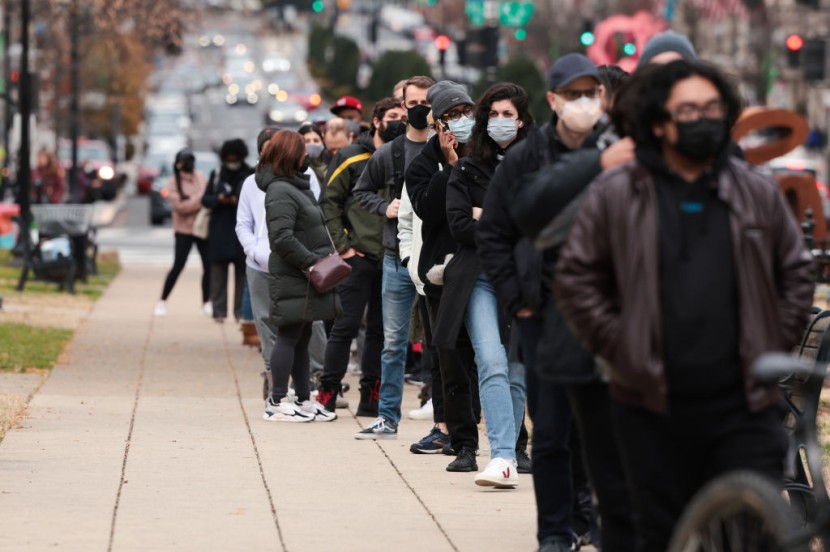
Some medical experts criticize the US government's decision to reduce the recommended COVID-19 isolation and quarantine period from ten to five days, claiming that it will cause greater confusion and panic among Americans.
Much to the dismay of some authorities, the new guidelines allow people to leave isolation without being tested to check if they are still infectious. The recommendation has sparked debate over how it was written and why it was revised now, in the midst of yet another wintertime rise in cases, this one mostly due to the highly contagious COVID-19 Omicron variant.
US' new COVID-19 isolation period stirs confusion
The Centers for Disease Control and Prevention said on Monday that the recommended isolation period for Americans who are infected with the coronavirus but have no symptoms had been slashed in half. Similarly, the CDC has reduced the amount of time that those who have come into close contact with an infected person must be quarantined, AP News reported.
The CDC has been pressed by the public and commercial sectors, notably the aviation industry, to limit the time spent in isolation and the possibility of severe staffing shortages as a result of the Omicron outbreak. Thousands of flights have been grounded in recent days as a result of the Omicron surge.
Per ABC News, the CDC decreased the recommended isolation period by half for Americans who are infected with the coronavirus but have no symptoms after taking action on Monday. Similarly, the CDC reduced the period of time persons who have had close contact with an infected person must quarantine.
The CDC has been pressured by the public and commercial sectors, especially the aviation industry, to limit the time spent in isolation and the possibility of severe staffing shortages resulting from the omicron outbreak. In a debacle blamed on Omicron, many flights have been canceled recently. The advice is in line with accumulating evidence that persons who have the virus are most contagious in the first few days, according to CDC authorities.
The CDC's guidelines have a scientific basis, according to Louis Mansky, head of the University of Minnesota's Institute for Molecular Virology. Although medical professionals noted that nearly all of the data predated Omicron, research, including a study published in the journal JAMA Internal Medicine in August, backs that up.
The CDC released a report on a cluster of six omicron cases in a Nebraska household on Tuesday, finding that the median incubation period - the time between exposure and the onset of symptoms - was about three days, compared to the five days or more documented earlier in the pandemic. The six persons also got sick, but it was only a minor ailment. Other experts, on the other hand, questioned why the CDC standards enable persons to be released from isolation without being tested.
Businesses said Tuesday that new federal recommendations decreasing the necessary isolation periods for many infected Americans would help alleviate staffing shortages. Still, labor unions warned that the move could force some employees back to work too soon.
Representatives from various industries, including air travel, food, and retail, praised the new approach. The Omicron variant has ripped through already understaffed regions, forcing eateries to close temporarily and thousands of flights to be canceled, disrupting Christmas travel.
According to FlightAware, an aviation data provider, more than 1,000 flights "inside, into, or out of the United States" were canceled on Tuesday. However, the Association of Flight Attendants, which represents roughly 50,000 flight crew members, had maintained that employees should not be expected to return to work unless they were free of symptoms and had passed a drug test.
Shortened isolation will ease company staffing woes
The news was welcomed by Jon Hurst, president of the Massachusetts Retailers Association, especially in this state, where the vaccination rate is relatively high. The news came as a comfort to Ronn Garry, proprietor of Roxbury's Tropical Foods grocery shop. His employees are mainly vaccinated and mandated to wear masks at work, so the new policy "seems appropriate," he says, as per The Boston Globe.
Others, like Mitchell Fallon, communications and political director for the New England Joint Board UNITE HERE, a union that represents workers in the textile, garment, manufacturing, warehousing, laundry, human service, and hospitality industries, were surprised by the new CDC guidance, which he believes was influenced "in part due to pressure from major corporations."
Related Article : CDC Slashes Recommended COVID-19 Isolation, Quarantine Period To 5 Days for Coronavirus-Positive Americans
© 2025 HNGN, All rights reserved. Do not reproduce without permission.








